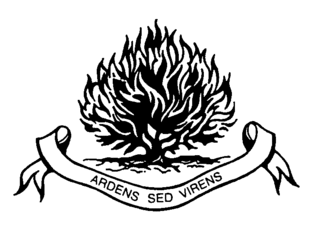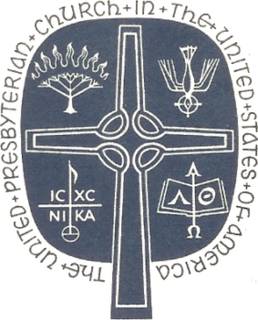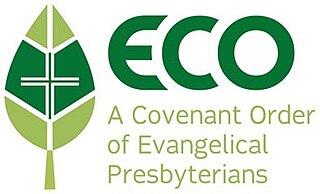
Presbyterianism is a part of the reformed tradition within Protestantism, which traces its origins to Britain, particularly Scotland.

The Cumberland Presbyterian Church is a Presbyterian Christian denomination spawned by the Second Great Awakening. In 2015, it had 70,810 members and 709 congregations, of which 51 were located outside of the United States. The word Cumberland comes from the Cumberland River valley where the church was founded.

The Presbyterian Church in the United States was a Protestant Christian denomination in the Southern and border states of the United States that existed from 1861 to 1983. That year it merged with the United Presbyterian Church in the United States of America (UPCUSA) to form the Presbyterian Church (USA).

The United Presbyterian Church in the United States of America (UPCUSA) was the largest branch of Presbyterianism in the United States from May 28, 1958, to 1983. It was formed by the union of the Presbyterian Church in the United States of America (PCUSA), often referred to as the "Northern" Presbyterian Church, with the United Presbyterian Church of North America (UPCNA), a smaller church of Covenanter-Seceder tradition at a conference in downtown Pittsburgh, Pennsylvania, in May 1958. Vigorous ecumenical activity on the part of PCUSA leaders led to this merger, something of a reunion of two long-separated branches of the larger Presbyterian family deriving from the British Isles.

The Non-subscribing Presbyterian Church of Ireland has its origins with those early 18th-century Presbyterian ministers who refused to subscribe at their ordination to the Westminster Confession, a standard Reformed (Calvinist) statement of faith; and who were placed, in 1725, the Presbytery of Antrim. A similar disagreement led to the creation of the Remonstrant Synod of Ulster in 1830. In 1835 the two bodies together with the Synod of Munster formed the Association of Irish Non-subscribing Presbyterians.

The Free Presbyterian Church of Scotland was formed in 1893 and claims to be the spiritual descendant of the Scottish Reformation: its web-site states that it is 'the constitutional heir of the historic Church of Scotland'. It is occasionally referred to by the pejorative term the Wee Wee Frees. Although small the church has congregations on five continents.

The Presbyterian Church in Canada is a Presbyterian denomination, serving in Canada under this name since 1875. The United Church of Canada claimed the right to the name from 1925 to 1939. According to the Canada 2001 Census 409,830 Canadians identify themselves as Presbyterian, that is, 1.4% of the population.

The Presbyterian Church in the United States of America (PCUSA) was the first national Presbyterian denomination in the United States, existing from 1789 to 1958. In that year, the PCUSA merged with the United Presbyterian Church of North America, a denomination with roots in the Seceder and Covenanter traditions of Presbyterianism. The new church was named the United Presbyterian Church in the United States of America. It was a predecessor to the contemporary Presbyterian Church (USA).
The Presbyterian Reformed Church is a Christian denomination that was founded in Ontario, Canada on November 17, 1965, whose churches continue the historic Scottish Presbyterian orthodoxy in doctrine, worship, government and discipline, on the basis of a conviction that these principles and practices are founded in and are agreeable to the Word of God.
The Cumberland Presbyterian Church in America is a Historically African-American denomination which developed from the Cumberland Presbyterian Church in 1874.
The Evangelical Reformed Presbyterian Church was a Christian denomination of the Reformed tradition founded in late 2004. The first member churches were received in 2005. According to information on its website, the ERPC's formation was in response to a perceived acceptance by churches such as the Orthodox Presbyterian Church and Presbyterian Church in America of departures from Biblical doctrine in a number of areas, including:

David Steele, Sr. was a Reformed Presbyterian or Covenanter minister. He was born in Upper Creevagh, Donegal, Ireland to David Steel and Sarah Gailey. His father was a fourth-generation descendant of Capt. John Steel of Lesmahagow, Lanarkshire, Scotland, a local leader in the Covenanter uprising of 1679. His grandparents, on both sides of the family, were Covenanters. His paternal grandfather, John Steel, had resided in Fanet. He moved to Creevaugh sometime prior to the birth of his grandson. His maternal grandfather, Andrew Gailey, resided in Killylastin. His father died when he was an infant, in February, 1805. According to Steele, his only recollection of his father was conducting family worship. Next to the Bible, Steele claimed the greatest impression made on him, in his youth, was Thomas Boston's Four-fold State of Man and A Cloud of witnesses for the royal prerogatives of Jesus Christ. The latter work is an account, published in 1714, of the Scottish martyrs who perished during the persecutions, known as the "Killing Times", during the reigns of Charles II and James VII. In his seventeenth year [1820], he entered the Academy in Londonderry, where he pursued his studies for three years, including the study of languages.
The Free Presbyterian Church of Victoria, also known as the Free Church of Australia Felix, was an Australian Presbyterian denomination founded in Melbourne, Victoria in 1846 as a result of the Disruption of 1843 in the Church of Scotland.

The Reformed Presbyterian Church of Vernon is a historic church in the Town of Vernon in southeastern Waukesha County, Wisconsin, United States. It is also listed as Covenanter Church. Built in 1853, and formerly a congregation of the Reformed Presbyterian Church of North America, it has been listed on the National Register of Historic Places since 1999.

The Reformed Presbyterian Church of North America (RPCNA) is a Presbyterian church with congregations and missions throughout the United States, Canada, and Japan. Its beliefs—formulated via membership in the Reformed Presbyterian Church and RP Global Alliance—place it in the conservative wing of the Reformed family of Protestant churches. Below the Bible—which is held as divinely inspired and without error—the church is committed to several "subordinate standards," together considered with its constitution: the Westminster Confession of Faith and Larger and Shorter Catechisms, along with its Testimony, Directory for Church Government, the Book of Discipline, and Directory for Worship.
Robert Adam Holliday Lusk was a Reformed Presbyterian or Covenanter minister of the strictest sort, in a century which, according to Presbyterian historian Robert E. Thompson, was marked by increasing relaxation into less stringent manifestations of doctrine and practice amongst all branches of Presbyterianism. His career crossed paths with many prominent ministers and he was involved in numerous ecclesiastical courts at pivotal moments in the history of the Reformed Presbyterian Church. Amongst Reformed Presbyterians, he was an "Old Light," and amongst "Old Lights," he would lay claim to be an "Original Covenanter." He was descended from a long line of Scotch-Irish. The Lusks were people of Scottish descent who, due to both civil and religious persecution, fled Scotland to the northern counties of Ireland. They were Ulster Protestants of the Presbyterian persuasion, a persuasion characterized by fastidious religious observance mixed with an aversion to authoritative persecution. Many of these Lusks settled in America prior to the American Revolutionary War.

ECO: A Covenant Order of Evangelical Presbyterians is an evangelical Presbyterian denomination in the United States. As a Presbyterian church, ECO adheres to Reformed theology and Presbyterian polity. It was established in 2012 by former congregations and members of the Presbyterian Church (USA), abbreviated PC(USA). Dissatisfaction with the declining membership of the PC(USA) along with growing denominational disputes over theology and bureaucracy led to the founding of ECO. ECO has over 380 congregations and over 500 pastors.

The Presbytery of Philadelphia, known during its early years simply as the Presbytery or the General Presbytery, is a presbytery of the Presbyterian Church (U.S.A.). It was the first organized presbytery in what was to become the United States.

Presbyterianism has had a presence in the United States since colonial times and has exerted an important influence over broader American religion and culture.


















